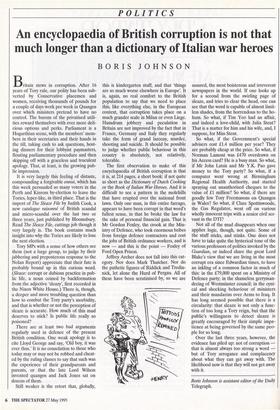POLITICS
An encyclopaedia of British corruption is not that much longer than a dictionary of Italian war heroes
BORIS JOHNSON
It is very largely this feeling of distaste, compounding a forgivable ennui, which has this week persuaded so many voters in the Perth and Kinross by-election to leave the Tories, leper-like, in third place. That is the import of The Sleaze File by Judith Cook, a new catalogue raisonne of British scandal and micro-scandal over the last two or three years, just published by Bloomsbury. Read The Sleaze File, cuttings job though it very largely is. The book contains much insight into why the Tories are likely to lose the next election.
Tory MPs with a sense of how others see them (not a large group, to judge by their jabbering and preposterous response to the Nolan Report) appreciate that their fate is probably bound up in this curious word. (Sleaze: corrupt or dubious practice in pub- lic life, a noun coined by backformation from the adjective 'sleazy', first recorded in the Nixon White House.) There is, though, a deeper and more troubling question than how to combat the Tory party's morbidity, and that is whether or not the perception of sleaze is accurate. How much of this mud deserves to stick? Is public life really so poisoned?
There are at least two bad arguments regularly used in defence of the present British condition. One weak apology is to cite Lloyd George and say, 'Old boy, it was ever thus.' It is no consolation to those who today may or may not be robbed and cheat- ed by the ruling classes to say that such was the experience of their grandparents and parents, or that the late Lord Wilson invented quangos and Jack Jones sat on dozens of them.
Still weaker is the retort that, globally, this is kindergarten stuff, and that 'things are so much worse elsewhere in Europe'. It is, again, no real comfort to the British population to say that we need to place this, like everything else, in the European context, that corruption takes place on a much grander scale in Milan or even Liege. Humdrum jobbery and peculation in Britain are not improved by the fact that in France, Germany and Italy they regularly take the form of grand larceny, murder, shooting and suicide. It should be possible to judge whether public behaviour in this country is absolutely, not relatively, tolerable.
The first observation to make of this encyclopaedia of British corruption is that it is, at 214 pages, a short book: if not quite as short as the Dictionary of Dutch Cooking or the Book of Italian War Heroes. And it is difficult to see a pattern in the molehills that have erupted over the national front lawn. Only one man, in this entire farrago, appears to have been corrupt in that word's fullest sense, in that he broke the law for the sake of personal financial gain. That is Mr Gordon Foxley, the crook at the Min- istry of Defence, who took enormous bribes from foreign defence contractors and cost the jobs of British ordnance workers, and is now — and this is the point — Foxley of Ford Open Prison.
Jeffrey Archer does not fall into this cat- egory. Nor does Mark Thatcher. Nor do the pathetic figures of Riddick and Tredin- nick, let alone the Hurd of Pergau. All of these have been scrutinised by, so we are assured, the most boisterous and irreverent newspapers in the world. If one looks up for a second from the swirling page of sleaze, and tries to clear the head, one can see that the word is capable of almost limit- less shades, from the horrendous to the ho- hum. So what, if Tim Yeo had an affair, and indeed a love-child, with Julia Stent? That is a matter for him and his wife, and, I suppose, for Miss Stent.
So what, if the Government's special advisers cost £1.4 million per year? They are probably cheap at the price. So what, if Norman Lamont was £470 overdrawn on his Access card? He is a busy man. So what, if Mr John Latsis and Mr Y.K. Pao gave money to the Tory party? So what, if a computer went wrong at Birmingham Regional Health Authority, and started spraying out unauthorised cheques to the value of £1 million? So what, if there are goodly few Tory Freemasons on Quangos in Wales? So what, if Clare Spottiswoode, the Gas Regulator, went off on various wholly innocent trips with a senior civil ser- vant in the DTI?
Not all of the mud disappears when one applies logic, though, not quite. Some of the stuff sticks, and stinks. One does not have to take quite the hysterical tone of the various professors of politics invoked by the Guardian, or indeed share the great Lord Blake's view that we are living in the most corrupt era since Edwardian times, to have an inkling of a common factor in much of this: in the £79,000 spent on a Ministry of Defence party; in the shameless gerryman- dering of Westminster council; in the cyni- cal and shocking behaviour of ministers and their mandarins over Arms to Iraq. It has long seemed possible that there is a circularity: that sleaze is not only a func- tion of too long a Tory reign, but that the public's willingness to detect sleaze is greatly encouraged by their simple impa- tience at being governed by the same peo- ple for so long.
Over the last three years, however, the evidence has piled up: not of corruption that is almost always too strong a word but of Tory arrogance and complacency about what they can get away with. The likelihood now is that they will not get away with it.
Boris Johnson is assistant editor of the Daily Telegraph.


































































 Previous page
Previous page